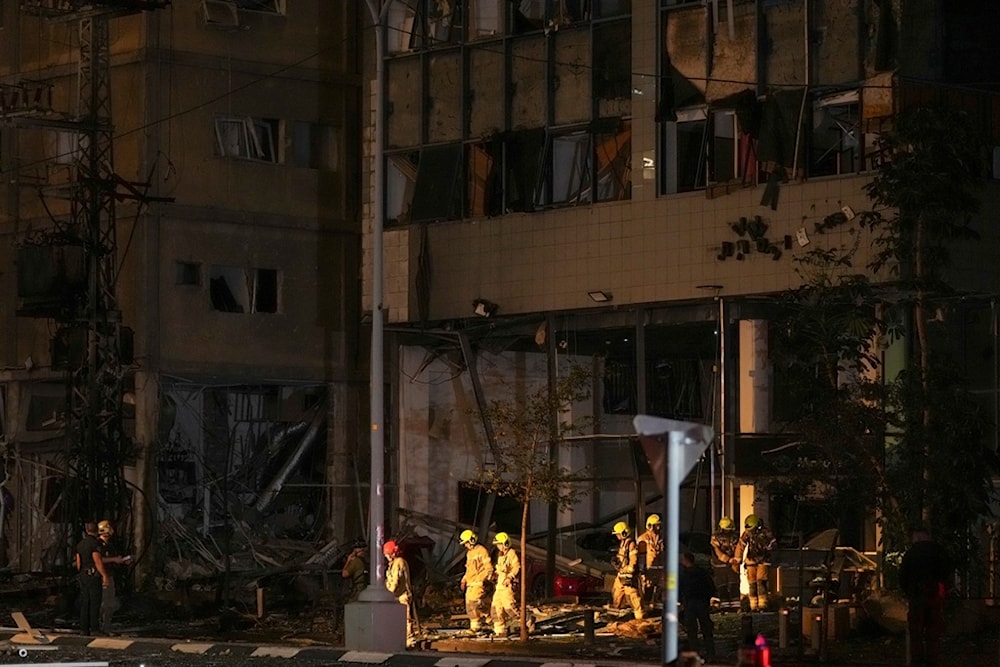Hezbollah might intensify strikes on central 'Israel': Israeli media
As ceasefire talks continue, with clear indications of "Israel's" desire to continue expanding its aggression, security estimations indicate that Hezbollah could intensify its attacks as a means of pressure.
-

Firemen exit a building damaged by a rocket attack in Ramat Gan, Tel Aviv district, Monday, November 18, 2024. (AP)
Hezbollah intends to intensify its attacks, particularly targeting central areas, in the coming days, security officials estimate, according to Israeli media.
This escalation, according to the reports, is seen as "a means of pressure by Hezbollah to expedite the conclusion of a deal."
In recent days, the Islamic Resistance in Lebanon has carried out operations against strategic targets in the center of the Israeli occupation, particularly Tel Aviv and its suburbs. The most recent attack was on Tuesday, when Hezbollah struck the Glilot Base, located 110 km from the border, with precision missiles.
On Monday, the Resistance also launched an attack using a swarm of advanced kamikaze drones on sensitive military sites in Tel Aviv. An initial statement from the Resistance noted that the details of these targets would be disclosed later.
This aerial attack was followed by a combined operation targeting the Tel Haim Base, which belongs to the Military Intelligence Division of the Israeli army, and is located in Tel Aviv, 120 km from the border. The base was struck with precision missiles and kamikaze drones.
After a rocket landed in Ramat Gan, a central settlement in the Greater Tel Aviv area, Walla political affairs analyst Barak Ravid stated that the developments represent "a significant escalation in attacks ahead of a potential agreement." He emphasized that "an incident like the one in Ramat Gan is a serious event."
"Hezbollah takes pride in its ability to continue launching rockets at Israeli [settlements] daily." As a result, "Hezbollah holds veto power over the entire agreement that Israel is attempting to impose, whether we like it or not, and whether we want it or not," he concluded.
Lebanon's position
As negotiations resume for a ceasefire in Lebanon, and amid Hezbollah's ongoing operations along the border and deeper into occupied territories, political affairs writer Radwan Akil suggested Tuesday that "a psychological war was waged against Lebanon yesterday to hold it responsible for the failure to reach a ceasefire agreement."
Speaking to Al Mayadeen, Akil emphasized "the harmony between the battlefield Resistance [by Hezbollah] and the political resistance led by Speaker of Parliament Nabih Berri."
Berri "will respond to US demands for guarantees for Israel by reaffirming Lebanon’s right to receive guarantees for its sovereignty," he indicated.
"Those involved in the ongoing negotiations, along with the field resistance, will not accept any concession that compromises Lebanon's sovereignty," Akil underlined, highlighting "a national consensus, including from the opposition, rejecting any Israeli violation of Lebanese sovereignty."
It is worth noting that Hezbollah's Deputy Secretary-General, Sheikh Naim Qassem, had previously expressed the Resistance's position on the matter, emphasizing that "the foundation of any negotiation is based on two principles: halting the aggression and ensuring the full protection of Lebanese sovereignty."
Sheikh Qassem made these remarks during a speech commemorating the fortieth day since the martyrdom of Sayyed Hassan Nasrallah. In his speech, he expressed confidence in Speaker Berri, who "carries the banner of political resistance."

 3 Min Read
3 Min Read








